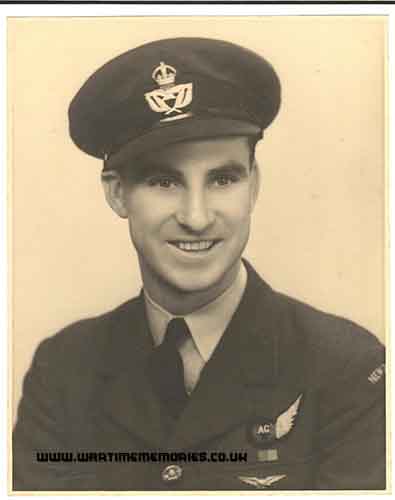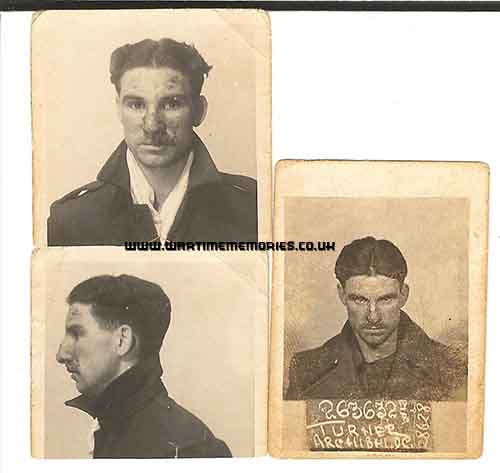Flt.Sgt. Archibald Clarke Turner
Royal New Zealand Air Force 7 Sqn
from:Christchurch, New Zealand
My Uncle Archie Turner joined the Royal New Zealand Air Force in 1940 at the age of 19. He was shipped to England and joined 7 Squadron Pathfinders RAF Bomber Command based at Oakington, 4 miles north of Cambridge, England. In 1943 Archie’s plane, an Avro Lancaster (serial No JB 303, nick-name Freddie), was on a bombing raid targeting Berlin, Germany. As a Pathfinder aircraft they guided other bombers to their targets using flares. The seven crew was made up of 6 Englishman & Archie.
- Pilot: F/O GA Beaumont from London, England (fallen)
- Navigator:. Sgt WA Meek from Edinburgh, Scotland (fallen)
- Bombardier: P/O Ansfield Ted, from Lancashire, England (captured)
- Flight Engineer: Sgt D. Ashworth, from Lancashire,England (fallen)
- Radio operator: F/S Wilson D from London, England (fallen)
- Turret gunner: Sgt PJ Palmer of London, England (fallen)
- Rear Gunner/Nav: F/S AC Turner, New Zealand (captured)
Sitting in the rear gun turret Archie’s job, as a tail-gunner, was to watch for enemy fighter planes and to shoot them down. About 20 miles northwest of Frankfurt, Germany Archie’s plane came under attack. Below is an excerpt from Flying Officer Ted Ansfield who along with Archie was the only survivors from the attack;
“Another echo suddenly appeared on his screen, he could barely utter a warning cry, the pilot reacted instantly and pushed the craft back to port to initiate a "corkscrew-defence manoeuvre” - but it was too late ... Our Lancaster, "Freddie", had received its deathblow. All four engines, the tanks and the fuselage were ablaze. The bomb doors were jammed and the release button for the bombs stopped responding because the power supply had been interrupted. The hydraulic system had also broken down. I quickly fixed our position on my air-to-ground radar and saw that we were about 20 miles northwest of Frankfurt. I wanted to pass this information on to the crew; however I saw that my radio had been shot away. As I straightened up, to reach my instruments, I also noticed that the sleeve of my flying suit was shot through. I leaned forward and shouted the established position to our Navigator - Bill Meek. He pulled the curtain aside in order to pass the message on to our radio operator who was supposed to report this information to our base, but Dave lay dead on his keyboard. I went forward to assist the pilot in manoeuvring the spinning aircraft. It was no use; we were quickly spiralling to the ground. The flight engineer - Dennis Ashworth - had received the order to "bale out" and removed the front hatch. At my request, he jumped. At that moment, I heard screams. It could really only be the pilot or the navigator, so I went back to the cockpit. But it was the turret gunner who was caught in the flames. This is confirmed by the rear gunner - Archie Turner, a New Zealander. After the command to "bale out", he left his turret and came toward the fuselage. There he saw that the turret gunner - P.J. Palmer - was surrounded by flames. After trying in vain to reach him, he strapped on his already singed parachute and left the aircraft. We tried again to stabilise our "Freddie’s" flight, but it was impossible. Beaumont, the pilot pressed my hand one last time and said: "See you in Hell." So I climbed up and out of the bow - at that moment there was a blinding flash, and from then on I knew nothing more... Our rear gunner Archie Turner maintains that while hanging from his parachute he observed a renewed night fighter attack that led to an explosion. This explosion had torn the aircraft apart. Seeing no parachutes, Archie Turner assumed he was the only survivor." After a number of days on the run Archie was captured by the Germans and taken to a Prisoner of War Camp, where he spent the rest of the war.

